By Anahita Hamzei*
Spring is on its way, bringing along with it some of our most cherished holidays this joyous time of year. When the early spring flowers of primrose, lilies, and hyacinth begin to blossom, thus do the hearts of the Iranian people as they prepare for a special holiday. As rare as the womanly flower that this special occasion symbolizes, Women's day in the Islamic Republic of Iran transpires, while conveying a unique cultural twist and spiritual message.
The most important element of this occasion, which sets it apart from the way others celebrate Woman’s day, is that it coincides with the birthdate of a great Islamic figure--Lady Fatimeh Zahra (as). This convergence of two great occasions: the celebration of womanhood, femininity, and fertility; and Fatimeh’s (as) birthday brings about brilliance to the meaning of Women’s day in the Islamic Republic.
Therefore, in honor of all the lovely women--mothers, grandmothers, great grandmothers, and all the mothers before them--who deserve the utmost respect, let's observe Hazrat Fatimeh’s (as) birthday and Women’s day by reminiscing on the wonderful history of this Islamic centered event and the traditions surrounding it.
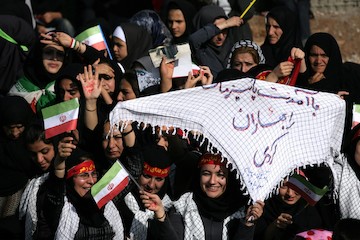
Who was Fatimeh (as)?
The celebration of womanhood in Iran goes beyond pretentious adornment and flattery; this day, in particular, draws from the recollection of one alpha female--whom of which beheld the best attributes and highest achievements mankind could obtain. Women’s day, Iran’s way, signifies the inner strength and beauty of a woman who stood bravely for the Islamic nation; namely, an icon for all women—Muslim, Christian, Atheist--Lady Fatimah Zahra (as). To explain how Lady Fatimeh’s (as) birthday and Women’s day became “one” we must delve deeply into the past, exploring whom this icon of the divine feminine was and what she stood for, beginning about 1400 years ago…
On the 20th day of Jamadi Al Sani (referenced from the Arabic calendar), in the second year of the Be'esat (the 5th year anniversary of Mohammad's prophethood declaration), from the sacred matrimonial union of the prophet and his honorable wife Khadija (pbut), an extraordinary infant was brought into this world; it was as if Allah reached into this world Himself to deliver this glorious blessing upon humankind. They would name their child Fatimeh (as). Immediately, after her emergence, to everyone’s unbeknownst, this little blessing of joy would make such a significant impact on humanity that in Islam she is held to the same status of Imam Ali (as), and all other infallibles. However, the only one who realized her value and significance would be the one touched by the Divine Creator himself, Prophet Mohammad (pbuh).
Ayatollah Khamenei so sweetly phrased in one of his speeches: “The spiritual positions of Fatima (as) are among the best spiritual positions, which belong only to a few individuals: she was infallible. Infallibility is particular to a few individuals who are chosen by Allah, and the great Hazrat Fatima Zahra (as) is one of these few individuals.” (1)
Hazrat Fatimeh (as) is held to such a high degree in Muslim societies, because she is viewed as the “cradle of the divine feminine”: encompassing everything pure, sacred, and positively innate that a woman possesses. She epitomized all the qualities of femininity and humanity so perfectly--without error. One example of those phenomenal traits occurred while Fatimeh Zahra (as) was a child. Immaculate Fatimeh’s (as) ability to love greatly and fearlessly arose at a very young age. For instance, about five years after Fatimeh’s (as) birth, her own mother, the first Muslima, Khadija (as) passed away. Fatimeh (as) was without a mother; but, it never held her back from her commitments to Allah and her loved ones. She was so attentive towards her father, more than the average child, Mohammad (pbuh)--a man without a mother and one who lost his wife--referred to her as his own mother; henceforth, he called her “Umme Abiha”-- which translates to the mother of her father. (2) At a young age she understood what many grown women could not. She was like an old soul of a thousand years wise, even as a child, with a divine blessing of wisdom and knowledge beyond her years, her abilities came effortlessly. This is but one great example of the many documented characteristics of Fatimeh (as).
As the years passed, and as the prophet’s (pbuh) lineage extended, Fatimeh (as) was the root of Imamate and Wilayat. She was the sublime blossom that gave rise to Ahlul Bayt, as it might be, reviving the bloodline of the prophet Mohammad (pbuh); hereafter, connecting all twelve of the great infallibles to the many living Shi’i Marjah and Sayyid birthed through the sowing of her lineage. Her own descendant, Imam Khomeini, spoke the following words of the woman who gave rise to the continuum of the divine prophet’s household:
“A woman in a small room of a humble home nurtured humans, their light shone from the vast expanse of the earth to the highest heavens from this world to the next. May blessings and peace from God, the Exalted, be upon this small room where the light of the divine majesty manifested and served as a nursery to the elite children among humankind. “(4)
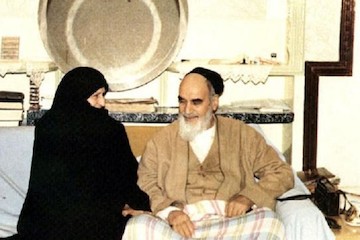
Her life, and how she gracefully lived out her servitude to Allah was so influential that Lady Fatimah (as) continues to inspire today. Fatimeh’s (as) greatest inspiration was perhaps upon the women of Iran who helped, as equals to men, to abolish the Second Age of Ignorance--Imam Khomeini referred to this second age as a time of immense humiliation and degradation for women living under the Pahlavi dynasty (4). It would be from her lasting impression that women of Iran would emerge as an extraordinary force: the recollection of this empowered momentum is projected through what Iranian women celebrate as “Women’s day” today.
“Fatimeh (as): a light at the end of a tunnel for women and a reason to fight.”
The torch of Fatimeh’s legacy, was the light at the end of a tunnel for Iranian women prepared to fight against injustice. Imam Khomeini believed women (like men), throughout time, experienced phases of progression, ascending out from ignorance. A great spiritual enlightenment. Imam Khomeini, like many other Muslims, believed Hazrat Fatimeh Zahra (as) was the first Muslim female to break through a human phase of unawareness and into transcendence. She evolved into perfection; therefore, it was she, the necessary pillar that would carry women through a Second Age of Ignorance almost 1400 years later after the first age of ignorance. During the Second Age of Ignorance the women of Iran needed a charismatic role-model to emulate in order to free them from the chains of oppression. They required a woman who knew their struggles; one they could relate to, yet was just as powerful and influential as the male role-models, like Ali and all other infallibles (pbut).
“She [Fatimeh (as)] was a young woman who enjoyed such a lofty position of spirituality which was equal to saints, prophets, and the like. Besides this spiritual position, each outstanding characteristic and each important role in the personal life of this great lady is a lesson.”(1)
Thus it was Fatimeh’s (as) spirit they leaned on, her traits were adopted and manifested by the Iranian women during challenging times. Her simple recollection was the strength that helped Iranian women rise from the ashes. Like Fatimeh (as), whom--during the Age of Ignorance--fought against oppression, women of Iran learned from her (as) to struggle against government oppression; this is one of the reasons why Women’s day, introduced after the shah’s removal, belongs to Fatimeh (as) and all women of Iran. Fatimeh’s (as) legacy was the light that would guide them out of the Shah’s dark era. Therefore, it is this remarkable day that connects kindred spirits of the faithful. Fatimeh (as) is the portal that stands between then and now. Her birthday, expressed as a day for all women, unites the recollection of a legend and women in Iran as a sisterhood that must continue to struggle--In the way of Allah--for their own self-worth; their place and value in society. Moreover, this amalgamate gives the Iranian Women's day its authenticity; standing on its own with great significance for the women of the nation. One that deserves greater honor and appreciation from this point of view. This is often mentioned by scholars like the great Ayatollah Khomeini, who was known for opposing and rejecting the humiliation of women, often seen in the West. In a sense, through his broad scope, women’s day needed a symbol that could embrace everything that encompassed that spirit of braveness and elegance Iranian women often displayed in those times. It also deserved its own signature to protest everything wrong with imperial and tyrannical governments. Once again who better to name represent the occasion than that of Fatimeh (as)? It was established by Imam Khomeini who made the following statements:
“Tomorrow is Women’s Day. It is the day when (the birth of) a woman is commemorated of whom the world is proud. It is the day commemorating a woman whose daughter stood against tyrannical governments, who recited that sermon and uttered those words, of which you are all aware.” (4)
“The history of Islam testifies to the limitless respect the Messenger of God, peace and blessings be upon him and his descendants, showed this noble infant, so as to demonstrate that woman has a special greatness in society, and if she is not superior to man, she is certainly no less than him. So this day is the day of woman’s revivification, and the day to establish her honor and the great role she plays in society” (4).
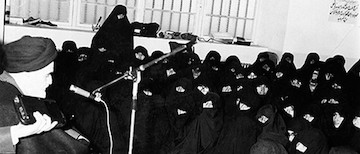
Although the juxtaposition of Fatimeh Zahra’s (as) birthday and woman’s day was never appreciated or considered by the overthrown Iranian shah, who amped up the influence of western culture in Iran, it would be shortly after the Iranian Revolution of 79’ that Ayatollah Khomeini established Lady Fatimeh’s birthday, once and for all, as Iran’s significant hallmark for Women’s day. The first to be celebrated on the fifth of May 1980.
Women’s Day in the Islamic Republic Today
As one who realizes it is best to place the integrity of a Holy occasions first, rather than the plethora of commercialized elements, rarely mentioned and important facts about Women's day and how it is celebrated in Iran must be presented. Celebrations for Fatimeh’s (as) birthday take place around the world wherever servants of Allah might be, but these “celebrations” focus less on superficial or material matters than anything else. It is a day for recognizing some of the best attributes of a woman--as displayed by Fatimeh Zahra (as). Women’s day is truly a day that is meant to bring out the best and the best to come from a woman trying to perfect her soul and purify her heart; an effort that is priceless and cannot be bought.
Hazrat Fatimeh (as) was not a “material girl”, and that is expressed through details of her life. For instance, she was more than willing to give away her material possessions if it eased the burdens of others. In fact, it is narrated: “On the night of her wedding, when Fatimeh Zahra (pbuh) was making her way to her husband’s home, wearing a new wedding dress, a poor woman approached her and asked for clothing to cover herself with. Rather than giving her the old dress which she had, she actually gave away her brand new wedding dress and wore her old clothes on her wedding night!” (5)
She was selfless. So, less emphases on the material matters the better for women who accept their heritage, culture and traditions in Iran. It must be established that Iran’s Women’s day is spent largely reflecting on who Hazrat Fatimeh (as) was and women might ask, “Who am I?” They might take advantage of this day to resolve their own jihads (struggles), by asking less self-absorbed questions like, “How can women improve on their own characteristics, self-worth, and adopt attributes that would lead them down the enlightened path of Fatimeh (as)?” or “Where do women need to improve on their own being and among their sisterhood, and how?” There is so much to think about and reflect upon, our beloved Lady Fatimeh (as) stood for so much. Institutions, female scholars, and political leaders, women all over the Islamic Republic of Iran hold daily seminars and activities that center on these important subjects.
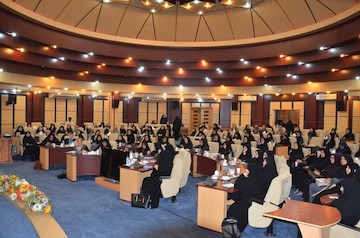
Together or alone in contemplation, women must try to channel all the great aspects of Fatimeh (as): her level of intelligence; her modesty; her genuine and honest character; her pursuits to maintain the ties of kinship and happiness among her loved ones; her will and ability to care for all people, as if all people were her children; and her qualities as a mother and engineer in the home. Women's day serves as a reminder to all women that we do have some great shoes to fill. We must continue to grow and fill into these shoes over time.
Imam Khomeini put it best when he said: “Strive to purify your character and to make your friends do likewise. Strive so that you react to the outrages committed against you. In your attempts to uphold all the qualities that make up the great character of woman, be as that unique woman, Hazrat Fatima Zahra, upon whom be peace, was. All of us should take our exemplar from Islam by looking at her and her children, and being as she was. Strive to acquire learning and godliness, for learning is not the preserve of any one person, learning is for all, godliness is for all, and striving to acquire learning and achieve godliness is the duty of us all. "(4)--and it is from her we build character and learn.
Naturally, we can never escape the fact that people--men, family, and children--in the lives of women do want to make them feel loved and appreciated; the material elements of the occasion are not totally absent. Women are adorned with flowers and gifts. Sacred offerings of flowers line the streets for Hazrat Fatimeh (as) and all women of Iran. Additionally, Women’s day among Iranians is definitely a day to reflect on the immediate women in our lives too. Women are appreciated, especially, every step they took in the direction of Hazrat Fatimeh (as).
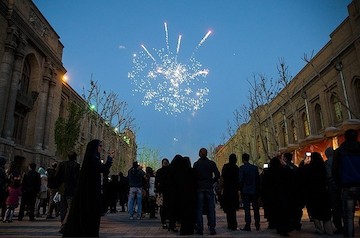
In my own experience with Women’s day, I sat about as a guest of honor in a school for all girls. Poets sang their hearts out for beloved Lady Fatimeh (as), women elaborated, in beautiful cascading voices, the details of her life story. The presentation area was decorated in bright colors and flowers. Sweets and teas were passed around to children and women enjoying the charitable event. After viewing a brilliant display of emotion for Fatimeh (as), the lights went back on, and the blinds were drawn open revealing the sun once again. I made many new wonderful friends that day, and scholars that left me with a gift of greater knowledge on Hazrat Fatimeh (as). Best Women’s day ever, at that point!
Overall, Women's day in Iranian society and culture is incomparable to other places, in terms of the spirituality and charity in the atmosphere; because, it cherishes and shares the sacred moments of welcoming Hazrat Fatimah (as) into the world with all virtuous women. It is at best a selfless day for Iranians. It is a day for character building. It is a day for expressing the capabilities of the Divine Creator’s brilliance through femininity. Finally, one must also keep in mind, women's day or a day to honor and respect your mother, wife, and daughter is actually every day. After all "paradise lies at the feet of your mother “(6)--a maxim that certainly calls for continuous respect of all women.
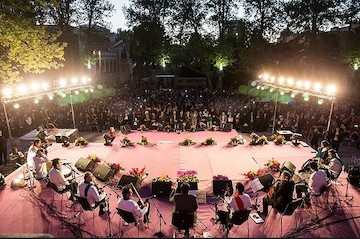
Works Cited:
1. Khamenei.ir English Fatima Zahra, the young lady with a lofty position equal to saints and prophets. Khamenei.ir . [Online] Khamenei.ir , April 19, 2014. [Cited: March 8, 2017.] http://english.khamenei.ir/news/3516/Fatima-Zahra-the-young-lady-with-a-lofty-position-equal-to-saints.
2. Leghaei, Mansour. Fatima (A.S.): the Mother of Her Father. Imam Reza (a.s.) Network. [Online] Imam Reza (a.s.) Network, 1998. [Cited: March 9, 2017.] https://www.imamreza.net/eng/imamreza.php?id=4609.
3. Khamenei, Ayatollah and Staff. The Sayyid Network. Getting to Know . [Online] The Sayyid Network, 1 5, 2013. [Cited: March 8, 2017.] http://sayyidali.com/viewpoints/fatima-as-is-representative-of-god-among-the-infallibles.html.
4. Khomeini, Ruhollah. The Position of Women from the Viewpoint of Imam Khomeini. Tehran : The Institute for Compilation and Publication of Imam Khomeini's Works (International Affairs Dept.), 2001.
5. Bhimji, Saleem. Fatima as the Perfect Role Model. s.l. : Al-Fath Al-Mubin Publications.
6. Al-Adl, Ansar. What Does Islam Say About Mothers? s.l. : IslamWomen.com.
*Anahita Hamzei is a two time graduate from the Texas A&M University System. She has received B.A.s in the human sciences and earned a Master of Science degree in Sociology. Mrs. Hamzei is an award winning speaker and researcher with published works in various fields of human and life sciences. She has traveled and lived in the Islamic Republic of Iran since 2013. She now journals and writes about her experiences, via news sites and social media, in an effort to debunk stereotypes and misconceptions spread by western propaganda.
The views, opinions and positions expressed on Op-Ed are those of the author(s) and do not necessarily reflect the views, opinions or positions of Khamenei.ir .









Comments